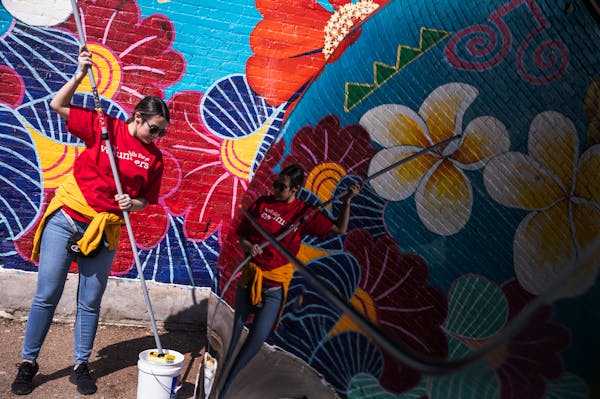The Rev. Jo Campe remembers the exact Sunday morning that he realized the Recovery Church was working.
"I noticed this row of people sitting in one of the pews," he said. "There was an inactive priest, two friends who were alcoholics, a schoolteacher, a narcotics agent who was having addiction issues, a judge, a hospital patient who had walked into the church by happenstance and a narcotics addict.
"I was the only one who knew their stories, but, of course, I couldn't mention any of this" because of the anonymity that is part of the recovery process, he said. "But I said to myself, 'That's our church! That's who we are, and it's a testament to the healing power of recovery.' "
Campe launched this mission in 1999 when he was assigned to Central Park United Methodist Church in downtown St. Paul. Once a bustling congregation with 1,133 members, it was considerably smaller than that when he arrived: There were 11 worshipers at his first service.
Now it has about 500 members, with another 300 at its sister church, Wesley United Methodist Church in downtown Minneapolis. Collectively known as the Recovery Church, they cater to addicts, former addicts and their families. Campe preaches at the St. Paul church at 9 a.m. Sundays, then drives to Minneapolis for a reprise of the sermon at 11 a.m.
It all started in a coffee shop.
"I was having coffee with three members [of the St. Paul church] when one of them suggested that we hold a recovery service," Campe said. "We had no clue what we were doing. We just outlined something on a napkin. Forty-seven people showed up for that service, so we began holding one a month. Then two a month. Then every Sunday. Now we have two churches."
He shrugged. "It just keeps plowing along, and I don't have a clue why, other than it's God's doing."
Campe, 64, has a master's of divinity degree from United Theological Seminary of the Twin Cities and a doctorate from Princeton Theological Seminary. He can debate esoteric theological issues all day long, if you want, and he has developed a commanding speaking presence from working at some of the biggest Methodist congregations in the state.
None of which does him much good in his current calling. His church members aren't interested in theory; they're looking for practical advice they can apply to their lives immediately. Even though there's a podium in the front of the congregation, he returns to it only briefly during his sermons to check his notes. He delivers his sermons while walking among the worshipers.
"If you're looking for a 'high steeple church,' you're in the wrong place," he said. "I've spoken on a podium with a choir behind me, and it was a great style for those churches. But this church is filled with people who understand life differently. They know that if they don't change the way they are living, they are going to die."
Firsthand experience
He went through his own battle with alcoholism, but few people beyond his immediate family realized it.
"I was very good at hiding it, which is not necessarily a good thing," he said. The higher he rose in the church, "the better I got at hiding it. But I knew that there was a hole in my soul. I couldn't reconcile my external with my internal."
He is convinced that his faith saved him, and now he's intent on sharing that tool with others. Every service focuses on the recovery theme.
"We stress how things can turn around, how Christianity can work," he said. "Alcohol is not the problem; life is the problem. There's a power that heals you by giving you a different way of life."
A member of the congregation who agreed to speak anonymously said he finds strength in knowing that everyone in the room is facing the same struggle he is.
"It's the 'birds of feather' phenomenon," he said. "We don't have to talk about it. We talk about the Twins or the weather or whatever, but we know that we're all in the same situation."
Campe agreed. "You look at the socioeconomic diversity -- the doctors and the lawyers sitting next to people who are coming in off the street -- and you realize that one thing that ties us all together is that we understand brokenness. We've all been through major issues in our lives in which, in some way, shape or form, we lost control."
That being said, worshipers are encouraged to discard their inhibitions. If they like Campe's sermon, they applaud. If he tells a groaner of a joke, they boo. If he touches a raw emotional nerve, they cry.
"It's OK to do that here," he said. "The other day there was a woman holding onto an usher, sobbing. I'd never seen her before in my life; I have no idea who she was. But if there's a place anyone should be accepted, it's in church."
A constant struggle
There are some aspects of the church that even he will never get used to. A funeral for a teenage drug addict is one of them.
"I'm standing in front of a casket of a 19-year-old girl who died of an overdose, and I'm supposed to say something to her parents, try to explain to them this crazy disease," he said, shaking his head.
Money is difficult. Many of the members simply don't have anything to give.
"Addicts lose their families, their houses and their jobs," he said. "Many of them end up living in the inner city in whatever accommodations they can find, and then they end up in one of my churches."
Keeping track of the members is another challenge. It's not uncommon for someone to go months without missing a Sunday and then vanish without a word. He doesn't know if they've left town, relapsed or dropped dead.
But he doesn't want to dwell on the negative. Each Sunday, a member of the congregation is asked to share a success story. There are a lot of them, he insisted.
"There are so many good stories about the people here," he said. "So many lives have been saved because of what the people do here and how much they care."
Jeff Strickler • 612-673-7392
Spanish court shelves latest tax probe of Shakira following prosecutors' recommendation

Review: In 'Dark Matter,' Joel Edgerton battles through parallel worlds

Yuen: Before she became known as Joe Mauer's mom, Teresa Mauer was a standout athlete

